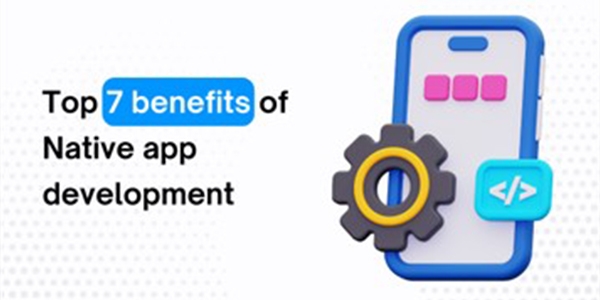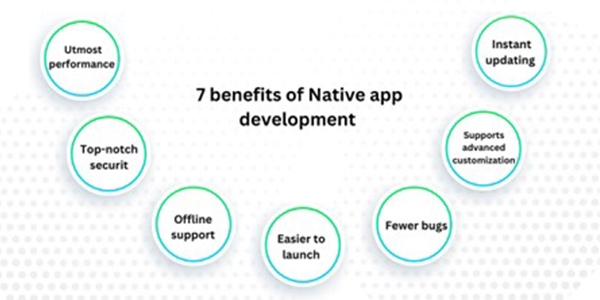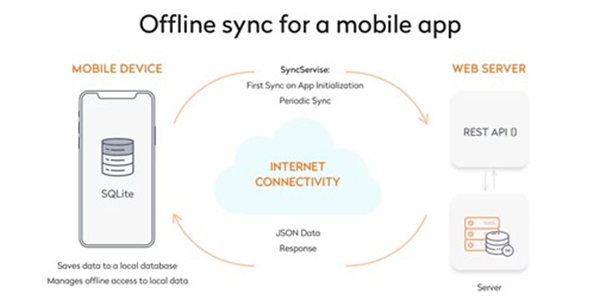
Imagine a scenario where you own a smartphone without an app; it would be like a MOTOROLA or an old-school NOKIA. As time passes and competition grows, you need to develop an application that makes you stand out from competitors.
But today’s users want an application with stunning user experience and flawless performance. That’s where native mobile apps come in.
So, in this guide, we will explore everything about native app development, its benefits, and the top use cases that help your business increase its ROI.
Table of Contents
What Are Native Apps?
Native apps are those applications that are built for specific device platforms such as Android or iOS. These applications live on your mobile device, and users can access such apps through an app store, or Google’s Play Store.
It means that if an app is developed for a specific operating system, it will not work on Apple iOS. As a native app developer, you must create separate apps for each operating system which involves more budget and development time.
You might wonder when you need to spend extra bucks on creating a separate app for each platform when you could get a cross-platform app that works across multiple devices.
The reason is simple – Native apps provide access to device features that would take ages for cross-platform apps.
For Instance – If you want to develop an Android app, you will need an Android app developer to develop apps using Java or Kotlin as the programming language. If you’re going to develop an iOS app, an iOS app developer uses Objective C or Swift as the programming language.
Additionally, native app developers can enhance users’ productivity using platform-specific capabilities such as GPS tracking, push notifications, etc.
7 Benefits Of Native App Development:
Here are various advantages of native app development.
Native Apps Offer The Utmost Performance:
Native mobile apps provide best-in-class performance as these apps are exclusively designed for a specific platform. As these apps directly interact with native APIs, they turn out to be faster and more responsive than hybrid or cross-platform apps.
These apps do not rely on middleware and are compiled with platform-specific programming languages, so these apps run more smoothly.
Top-Notch Security:
Another advantage of native apps is that they offer high security. These apps are more secure than hybrid apps because these apps are published on platforms once they go through some security control protocols.
In this digital world where cyber-attacks are increasing, mobile app development companies need to create secure mobile apps. As native apps are made for specific platforms, the data is encrypted with one infrastructure, reducing the number of risks.
Cross-platform and hybrid apps make use of web technologies such as HTML thus making the code more vulnerable to attackers. Regarding the security of native apps, the source code of these apps is less exposed to risks.
So, if you want to develop an app that secures customers’ data, developing a native app is a viable option.
Offline Support:
If you want to develop an app that works flawlessly without an internet connection, go with native apps. Unlike web applications that won’t work without an internet connection, these apps can work offline.
These mobile apps support offline functionality as the data is downloaded right from installation.
Thus, users can get more convenience by accessing an app’s functionalities and managing everything locally on the device, even in an offline environment. More importantly, it is useful for users staying in areas with limited data availability.
Easier To Launch In The Market:
It’s quite easy to launch the native app on the App Store or play store. As you follow all the operating system guidelines, the operating system is more likely to approve the release of your application.
The launch process is faster because app developers use the native tech stack and comply with the guidelines of the Google Play Store or Apple App Store.
Fewer Bugs:
In the case of native mobile app development, developers create 2 separate codebases for Android and iOS apps.
But, in the case of cross-platform applications, one codebase supports 2 different applications.
If you would ask us, which one will have fewer bugs? Then, it’s a native mobile app because you create different applications in separate codebases.
There are fewer bugs in the case of native apps because you are creating separate codebases using platform-specific APIs, and you are not dependent on any cross-platform tool such as Xamarin or Cordova.
Moreover, native app developers have access to SDKs, so they can start releasing apps with the most recent features.
Supports Advanced Customization:
Access to advanced customization means accessing all the features and tools available in devices and operating systems.
In the case of native apps, you can create a highly customized application because each app is developed for a specific platform. So, you no longer need to combine the features of different operating systems.
As native app developers get access to device hardware capabilities such as cameras, GPS, microphones, etc., their focus is to create exceptionally unique products that meet users’ specific requirements.
Instant Updating:
Native app developers can instantly add new features when Android or iOS roll out new updates.
While cross-platform app developers don’t have such features, they have to wait for additional tools and then launch new updates on their mobile applications, which slows down the process and degrades the user experience.
With native apps, the developer’s job becomes simpler because they can easily implement new updates when Android or iOS rollout.

Top Use Cases For Building A Native App:
Here are some use cases as to why your business should invest in developing native mobile apps-
If Investment In Such Apps Is A Top Priority:
Investing in native apps is an altogether expensive affair because these apps are costly to build. But if you have a limited development budget, you should develop cross-platform apps.
As investment in mobile apps requires a long-term commitment, you should decide which type of app you should invest in because investing in the wrong app is a failure for your business.
So, go with native apps if you aim to provide the utmost performance to end users because native apps are faster than non-native apps.
If Your App Depends On App Native Features:
Developing a native app is a viable option if you want to develop an app that requires native features and integrations. These apps give full access to device hardware capabilities, and developers can integrate more functionalities into an app.
For example – If you are developing a native app for iPhone, then you can leverage the benefits of various features such as Face ID or Apple Pay.
If User Experience Matters The Most To You:
Native apps offer a seamless experience to users because they have a close integration with platform capabilities. These apps are designed for specific platforms, so they offer superior performance as the native code runs directly on the operating system.
Wrapping Up:
This guide gives you everything you need to know about native app development.
So, if your motto is to offer the best-in-class user experience and explore native features, then choosing native app development is a viable option.
You can choose to go with developing cross-platform/hybrid apps if you have a limited development budget. But when it comes to delivering excellent user experience, then investment should not be a major concern for you.
And, if budget is the issue with you, ask yourself a few questions before choosing which type of app is better for your business.
- Is the development budget not a concern for you?
- Do you want to add advanced customizations in an app?
- Do you want to provide top-notch performance to users?
When the answer to all these questions is “YES”, go with native app development.

 About the Author:
About the Author:












Be the first to write a comment.